Integrate JFrog Container Registry
Secure your containerized applications by monitoring JFrog Container Registry for exposed secrets in container images and build artifacts.
Why Monitor JFrog Container Registry?
JFrog Container Registry serves as the enterprise-grade repository for your organization's production-ready container images. These images often contain production database credentials, enterprise API keys, and internal service tokens that, when exposed, can compromise critical business applications and provide unauthorized access to proprietary systems and sensitive customer data.
Capabilities
| Feature | Support | Details |
|---|---|---|
| Historical Scanning | ✅ (Supported) | Analyze existing images and their layers |
| Incremental Scanning | ✅ (Supported) | Regular scheduled scanning for new content |
| Monitored Perimeter | ✅ (Supported) | Granular monitoring of your repos |
| Team Perimeter | ⏳ (Coming Soon) | Users must be in the "All-incidents" team to access incidents |
| Presence Check | ❌ (Not Supported) | All occurrences considered present |
| Source Visibility | ❌ (Not Supported) | All sources are considered as private |
| File Attachments | N/A | Not applicable for container registries |
What we scan:
- All container image layers
- Dockerfiles and build configurations
- Environment variables in image metadata
This integration automatically scans your monitored repositories, downloading container images which may incur bandwidth costs. To optimize costs and reduce false positives, carefully select the sources to monitor use our filepath exclusion feature.
Plan requirements: Available for GitGuardian Business and Enterprise plans. Try it for free with a 30-day trial - any detected incidents remain accessible after the trial ends.
Detector coverage: To minimize false positives, Generic High Entropy Secret and Generic Password are disabled. All other detectors are enabled.
Setup your JFrog Container Registry integration
Prerequisites:
- Owner or Manager account on your GitGuardian Dashboard
- JFrog admin permissions to create Access Tokens in your JFrog instance
- Network connectivity between GitGuardian and your self-hosted services. Check out GitGuardian Bridge to enable secure connections between GitGuardian SaaS and your self-hosted services in private networks.
GitGuardian integrates with JFrog Container Registry via an Access Token with read-only access to your repositories.
You can install GitGuardian on multiple JFrog Container Registry instances to monitor your repositories.
-
Make sure you're logged as an administrator in your JFrog Platform
-
Go to Administration > User Management > Access Tokens
-
Click Generate Token
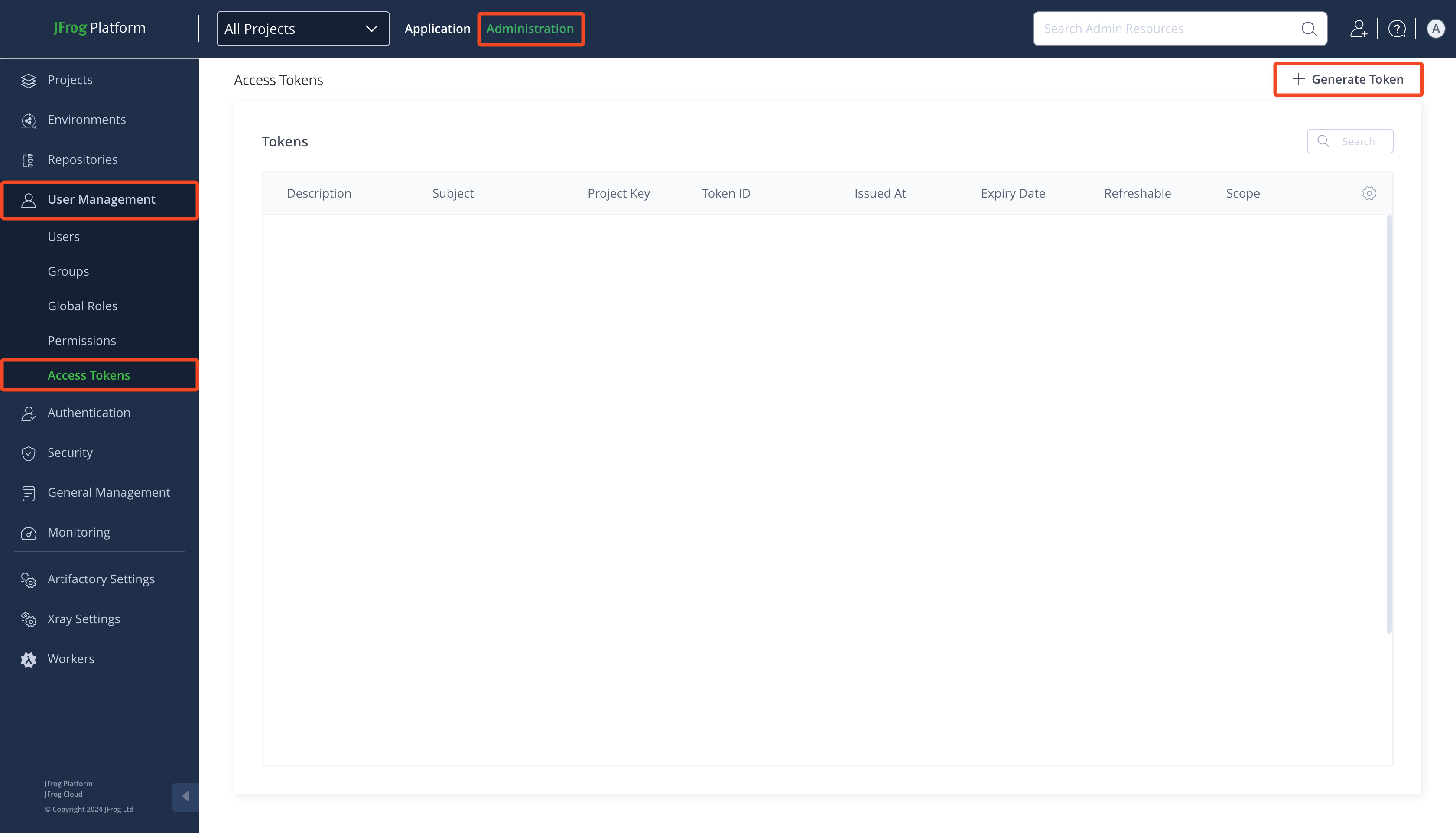
-
Type a Description (e.g.:
GitGuardian) -
Select
Groupas Token scope -
Select
readersas Groups -
Uncheck All and select
Artifactoryas Service -
Click Generate
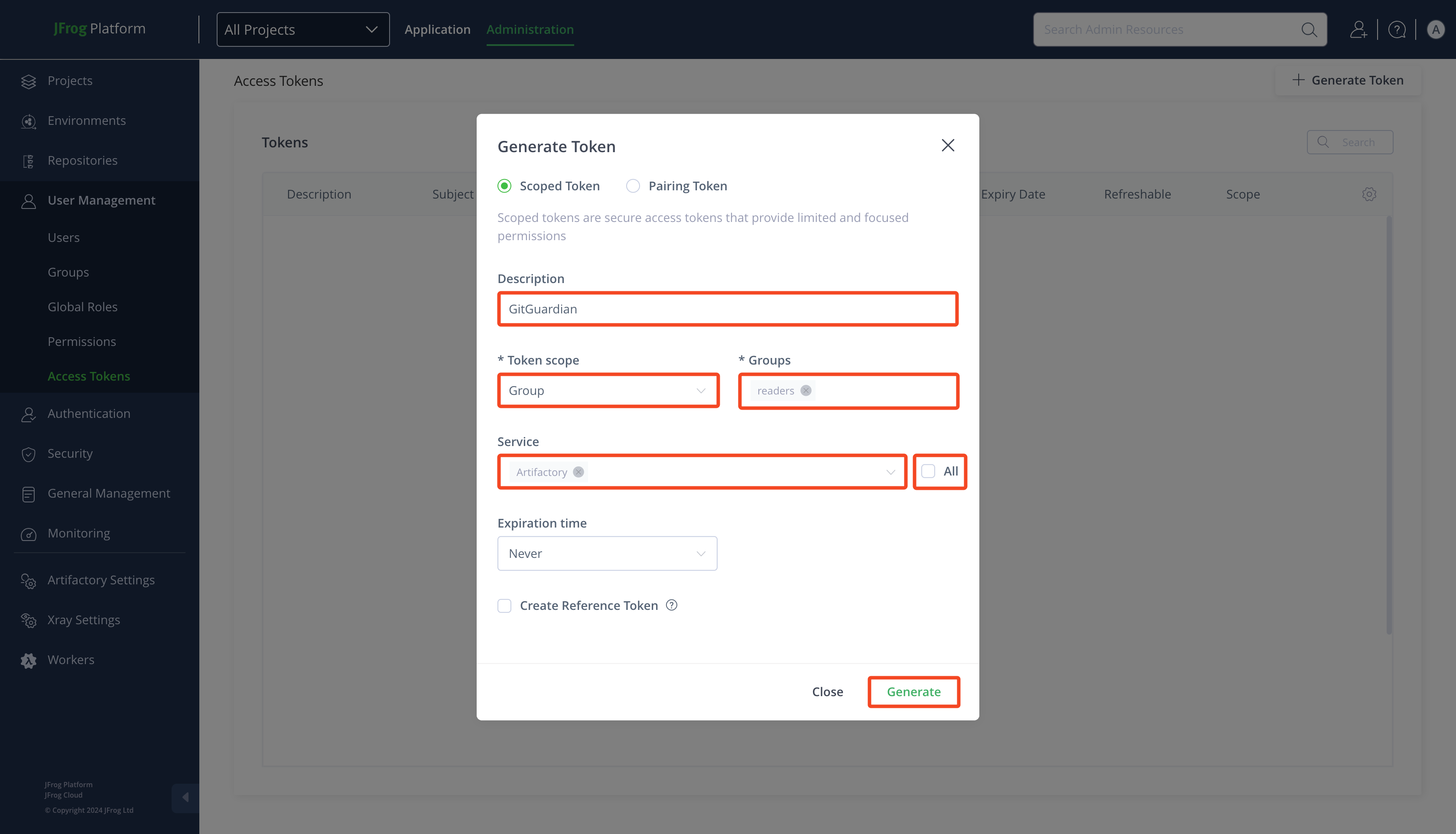
-
Get the Username and copy the Token
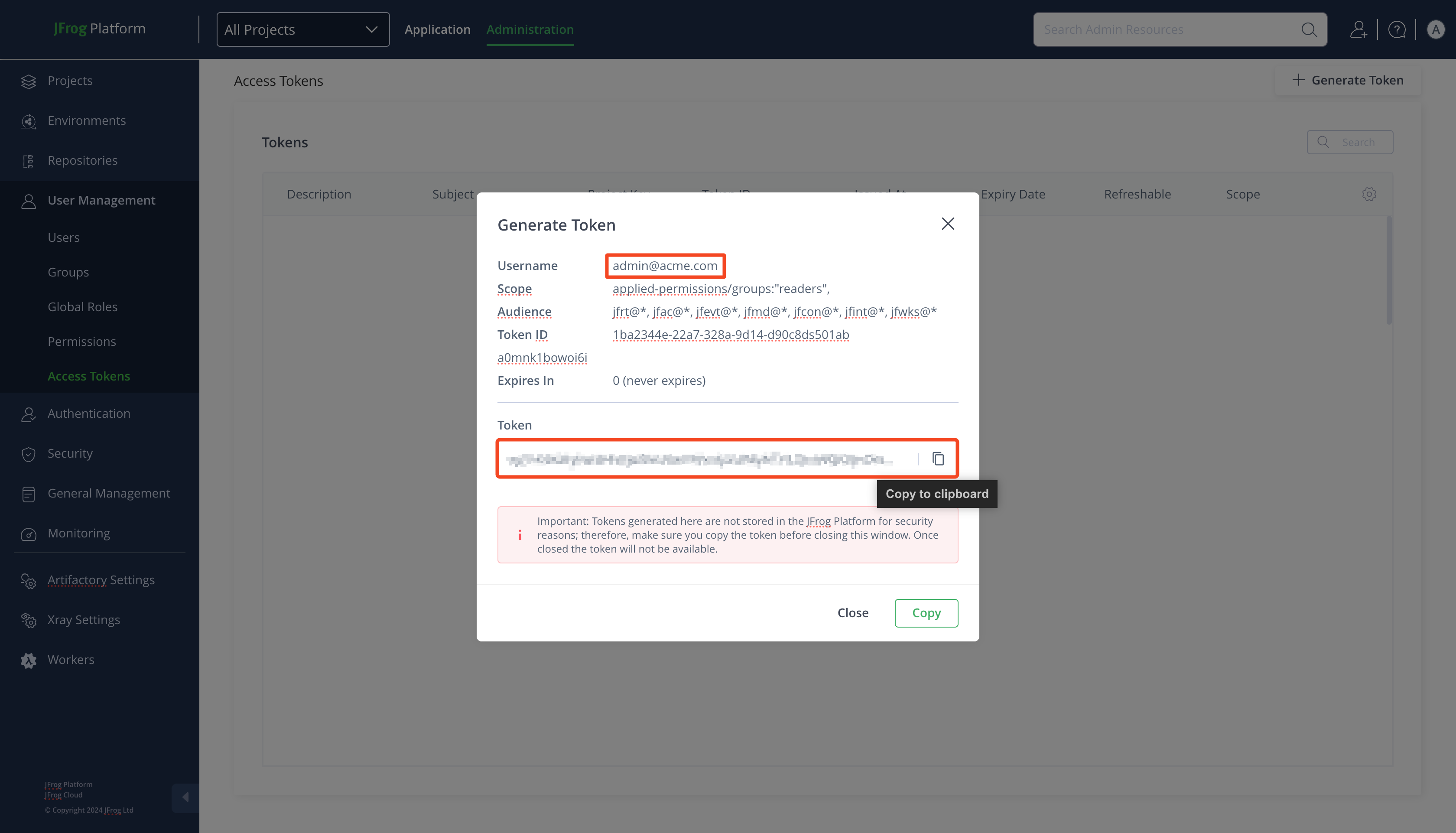
-
In the GitGuardian platform, navigate to the Sources integration page
-
Click Install next to JFrog Container Registry in the Container registries section

-
Click Install on the JFrog Container Registry integration page
-
Type your JFrog Container Registry instance URL (e.g.:
https://acme.jfrog.io/) -
Paste your Personal access token
-
Type the associated Username (e.g.:
admin@acme.com) -
Click Add
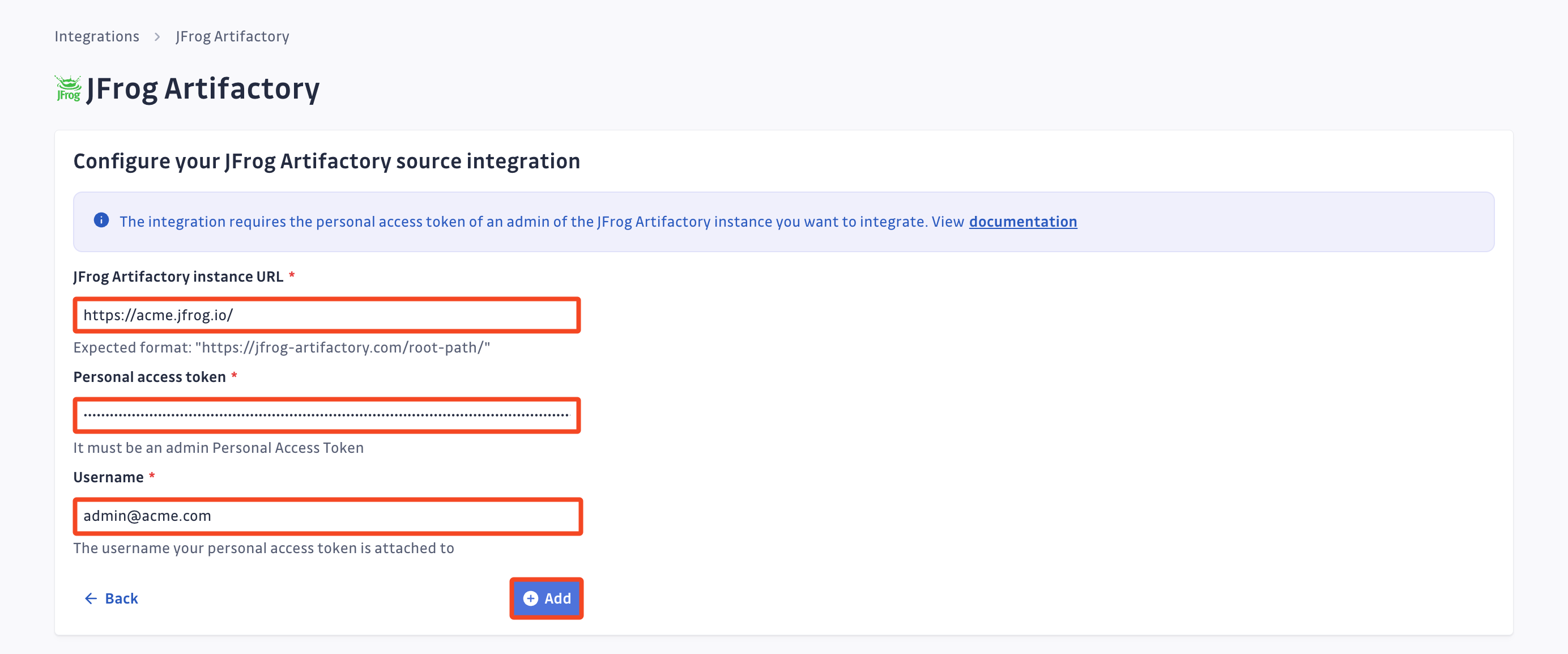
-
Customize your monitored perimeter:
- Monitor specific JFrog Container Registry repositories (Recommended)
- No repositories are monitored by default, you will have to select them manually.
- Newly created repositories will not be monitored by default. You can adjust this setting at any time.
- Recommended to optimize your bandwidth costs.
- Monitor the entire JFrog Container Registry instance
- All repositories are monitored by default with a full historical scan automatically triggered.
- Newly created repositories will be monitored by default. You can adjust this setting at any time.
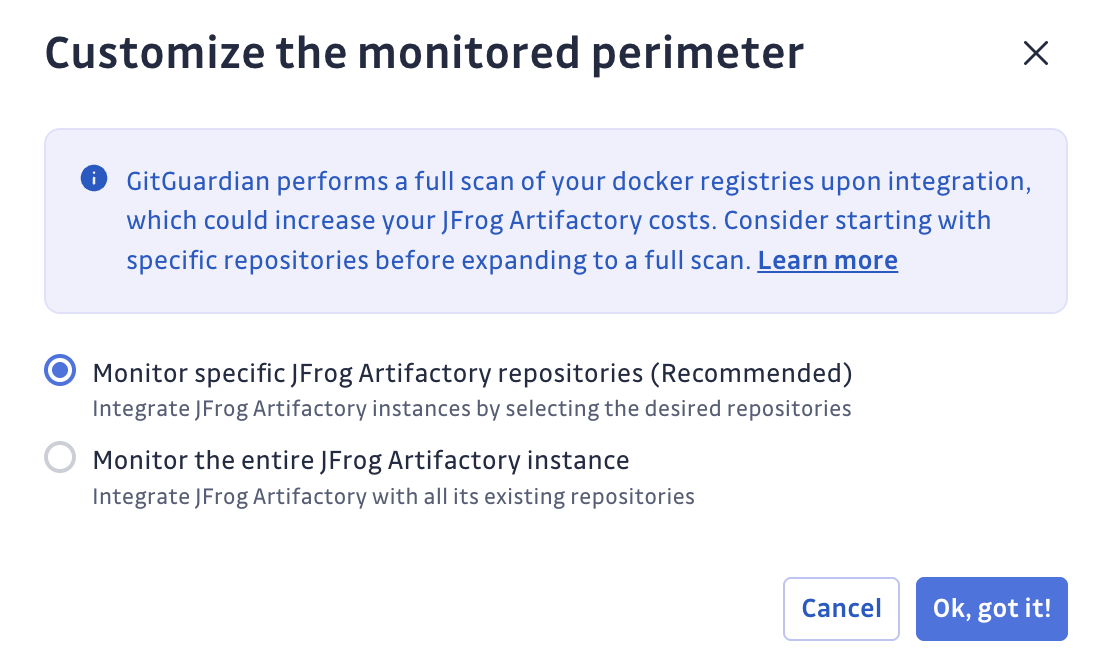
- Monitor specific JFrog Container Registry repositories (Recommended)
That's it! Your JFrog Container Registry instance is now installed, and GitGuardian is monitoring all Docker images of your selected repositories for secrets.
Customize your monitored perimeter
To customize the monitored repositories, navigate to your JFrog Container Registry settings.
- Select/Unselect repositories to include or exclude them from monitoring
- Confirm by clicking Update monitored perimeter

Automatic repository monitoring
You can enable or disable the automatic addition of newly created repositories to your monitored perimeter by switching the option in your JFrog Container Registry settings.

Uninstall your JFrog Container Registry instance
To uninstall a JFrog Container Registry instance:
- In the GitGuardian platform, navigate to the Sources integration page
- Click Edit next to JFrog Container Registry in the Container registries section
- Click the bin icon next to the JFrog Container Registry instance to uninstall
- Confirm by clicking Yes, uninstall in the confirmation modal
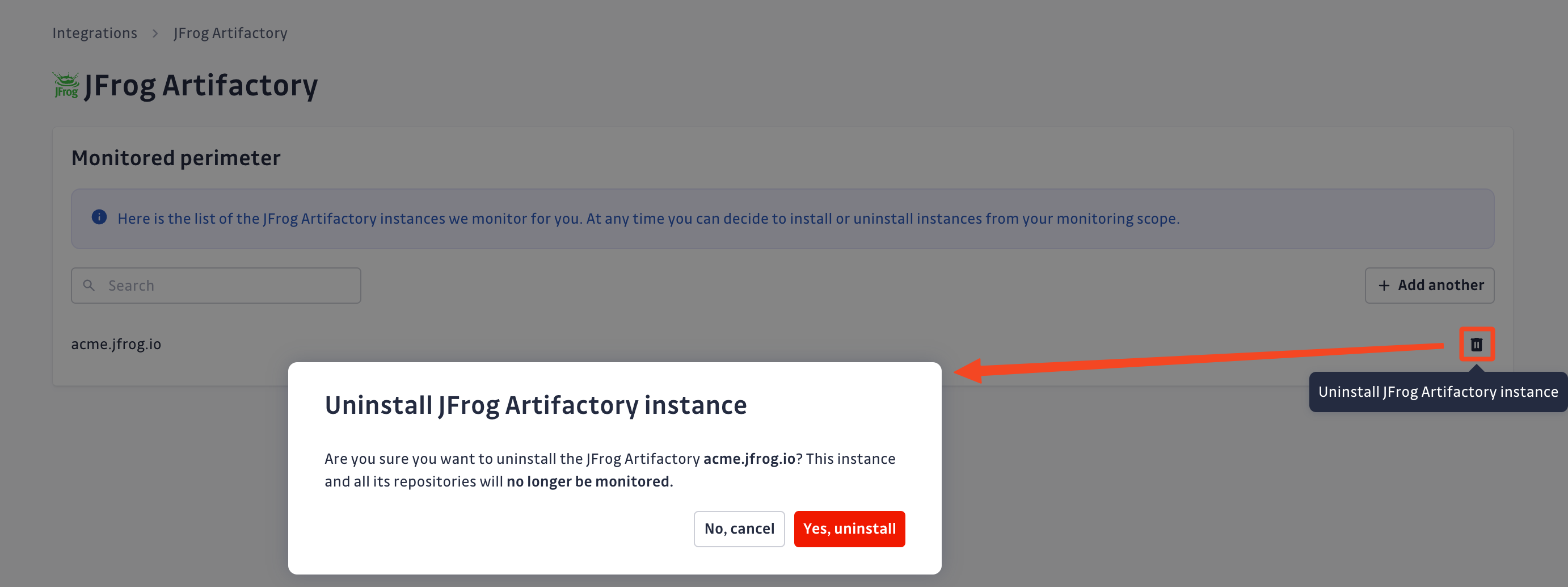
That's it! Your JFrog Container Registry instance is now uninstalled.
Excluded paths
GitGuardian automatically excludes files from scanning if their paths contain any of these regular expressions:
/__pypackages__/
/\.venv/
/\.tox/
/site-packages/
/venv/
distutils/command/register\.py
python.*/awscli/examples/
python.*/dulwich/(tests|contrib/test_)
python.*/hgext/bugzilla\.py
python.*/mercurial/util\.py
python.*/test/certdata/
python.*/urllib/request\.py
python.*/pygments/lexers/
/cryptography.+/tests/.+(fixtures|test)_.+\.py
/python.+pygpgme.+/tests/
botocore/data/.+/(examples|service)-.+\.json
usr(/local)?/lib/python.+/dist-packages
/libevent.+/info/test/test/
/conda-.+-py.+/info/test/tests.+/test_.+\.py
/python[^/]+/test/
/man/man5/kdc\.conf\.5
erlang.*(inets|ssl).*/examples/
/gems/.*httpclient.*/(test|sample)/
/gems/.*faraday.*/
/vendor/bundle/
/\.gem/
ruby-[^/]+/test/openssl/
/(g|G)o/src/cmd/go/internal/.*_test\.go
/(g|G)o/src/cmd/go/internal/.*/testdata/
/(g|G)o/src/cmd/go/testdata/
/(g|G)o/src/crypto/x509/platform_root_key\.pem
/(G|g)o/src/crypto/(tls|x509)/.*_test\.go
/(g|G)o/src/net/(url|http)/.*_test\.go
src/github.com/DataDog/datadog-agent/.*test.*\.go
google/internal/.*_test\.go
golang.org.*oauth2@.*/.*\.go
/flutter/.*/packages/flutter_tools/test/data/
/flutter/.*/examples/image_list/lib
/\.pub-cache
etc/ssl/private/ssl-cert-snakeoil\.key
perl.*Cwd\.pm
ansible/.*/tests/(integration|unit)/
ansible/.*/test/awx
ansible/collections/ansible_collections/.*/plugins/
/curl/.*/(tests|docs|lib/url\.c)
/doc/wget.+/NEWS
dist/awscli/examples/
usr(/local)?/lib/aws-cli/examples/
/google-cloud-sdk/(lib|platform)/
\.git/modules/third[-_]?party/
\.git/modules/external/
/\.npm/_cacache
/node_modules/
/\.parcel-cache/
/\.yarn/cache/
/\.m2/
/\.ivy2/cache/
/\.mix/
/\.hex/
/composer/cache/
/\.nuget/packages/
/libgpg-error/errorref\.txt
/Homebrew/Library/Taps/
/tcl[^/]+/http-.+\.tm
/tcl[^/]+/[^/]+/http-.+\.tm
usr/share/lua/[^/]+/posix/init\.lua
openssl/openssl-[^/]+/test/recipes/
usr/share/doc/libssl-doc/demos/
boringssl/src/third_party/[^/]+test[^/]+/[^/]+_test\.json
Additional Self-Hosted considerations
For GitGuardian Self-Hosted instances, scan frequency can be configured in the Admin Area:
- Time interval unit: seconds
- Default value: 86400 (1 day)
- Minimum value: 1800 (30 minutes)
Privacy
Country-specific laws and regulations may require you to inform your users that your repositories are being scanned for secrets. Here is a suggestion for a message you may want to use:
As part of our internal information security process, the company scans its repositories for potential secrets leaks using GitGuardian. All data collected will be processed for the purpose of detecting potential leaks. To find out more about how we manage your personal data and to exercise your rights, please refer to our employee/partner privacy notice. Please note that only repositories relating to the company’s activity and business may be monitored and that users shall refrain from sharing personal or sensitive data not relevant to the repository’s purpose.

